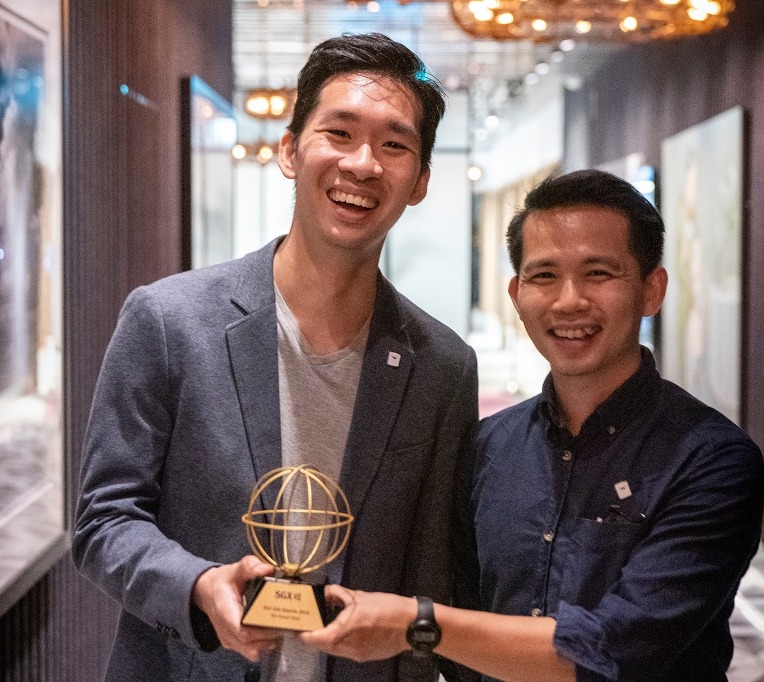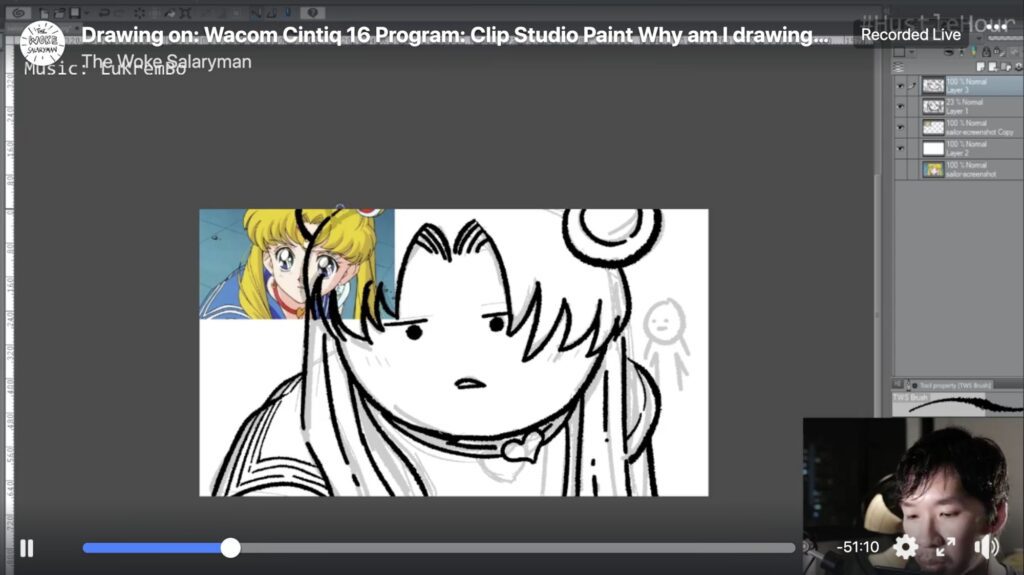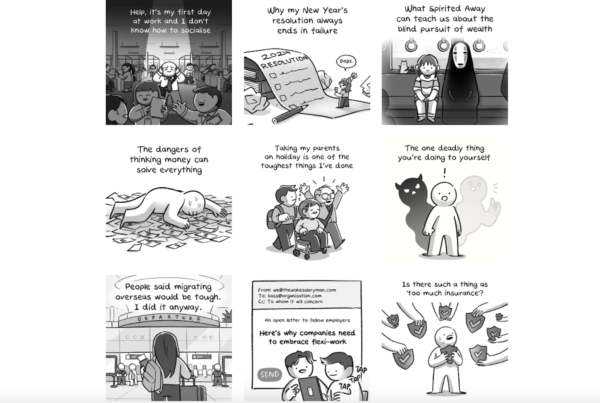The Woke Salaryman was supposed to be a sparkling portfolio piece for founders Ruiming He and Wei Choon Goh.
A cool little article, a few images—a showcase, really, of how great content could win over readers, convert buyers, and endear people to a brand.
“We had this idea of selling classes to businesses so that they could create better content marketing,” explains Ruiming. “The Woke Salaryman was just going to be an example of what we could teach them.”
Funny how things worked out.
A little over a year after its first post in April 2019, The Woke Salaryman is officially one of the top finance blogs in Singapore. Now, it’s no longer just a portfolio piece, but the focus of much of Ruiming and Wei Choon’s time.
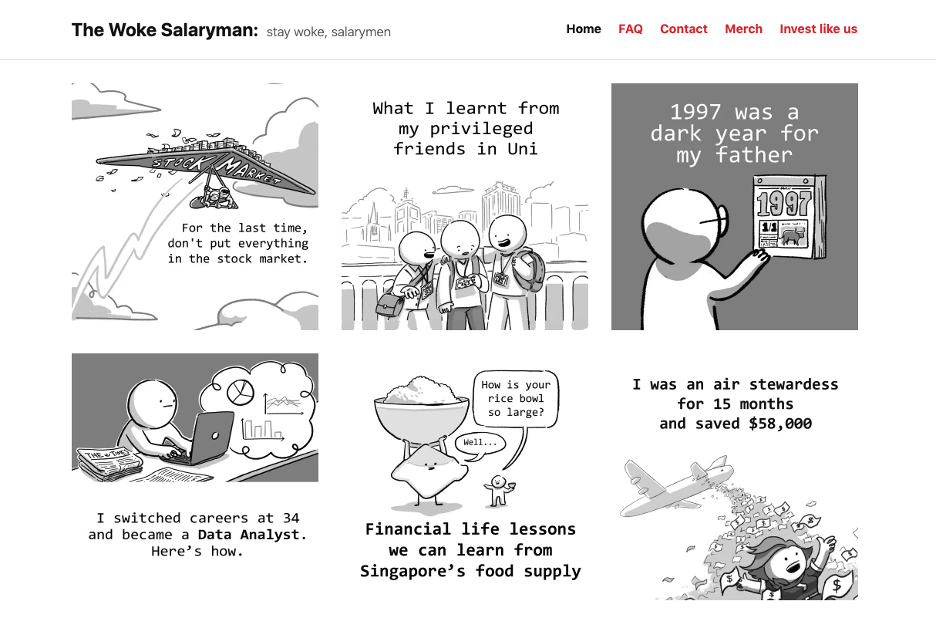
The Woke Salaryman currently has over 170,000 followers on Facebook, 115,000 followers on Instagram, and viral content galore. For perspective, when we first started writing this blog post in April, they had 123,000 followers on Facebook and 50,000 followers on Instagram.
Since then, they’ve also landed content partnerships with some of the most notable brands in Singapore, including OCBC Bank and Singapore Airlines.
Basically, a ton of growth in a really short period of time.
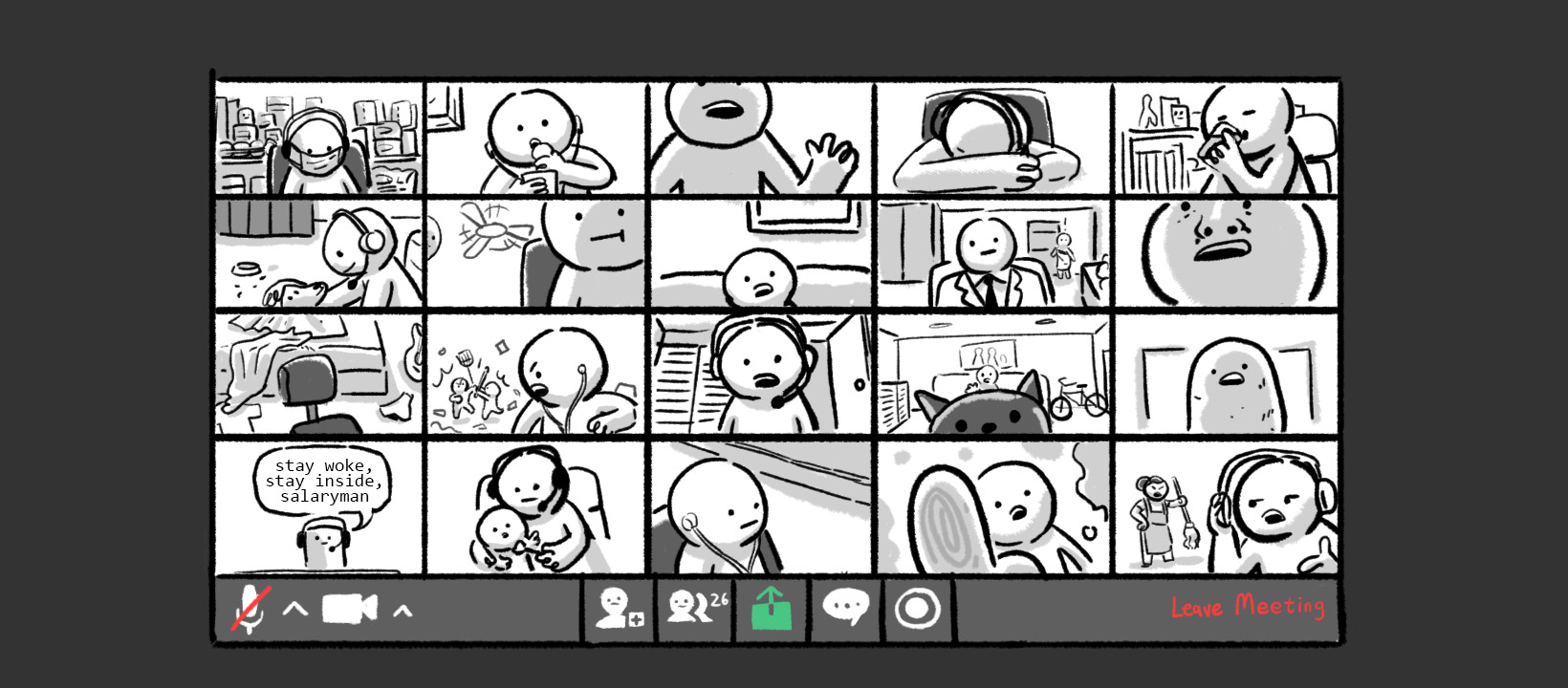
Clearly, it’s been an exciting year for these two Woke Salarymen. According to them, the success they’ve had so far was accomplished by staying true to their mission: emphasizing quality over quantity in all they do.
How it all began
Ruiming He became interested in personal finance after his mother had a stroke.
According to him, it was frustrating—and frightening—to see someone work so hard for 40 years, yet spend the rest of their life financially and physically dependent on others.
This kickstarted a passion for finance, and Ruiming began consuming financial information “super hardcore” to figure out how to earn money, spend wisely, and retire early.
Enter Wei Choon. The duo had been old friends since college days—they attended Ngee Ann Polytechnic together—and ended up working at the same news company.

Wei Choon on left, Ruiming on right
Though they both moved in the same advertising and content industry, Ruiming’s background is in copywriting, whereas Wei Choon is a visual storyteller who has experience as an advertising and marketing manager.
At the office, the two often worked on advertising projects together—Ruiming came up with concepts, and Wei Choon produced them—and in their spare time, they often shared insights and advice on personal finance (and gaming).
They eventually parted ways when Wei Choon left the company for a new job, but found that they collaborated so well together that they missed their working relationship.
“I think a common frustration that we had—especially Wei Choon—was the way our colleagues would approach content, especially internet or digital content,” recounts Ruiming.
During their stint at the same online news outlet, they’d learned a lot about Facebook and Instagram content. But upon returning to the advertising world, they were shocked to find that many people were still approaching content in a traditional—even stuffy—manner, focusing solely on hitting viewership targets and setting “measurable” goals.
“Brands weren’t working fast enough or responding quickly enough to the trends,” Ruiming explains. “By the time a campaign was ready to release, the momentum had already died down. You can’t do that in a digital, Internet world. Everything is about agility now.”
Iteration I: A simple Medium post
Ruiming’s first attempt at what would become The Woke Salaryman was a simple Medium post with a bunch of photoshopped diagrams.
“I published it on Medium and somehow got 500 shares,” he laughs. “Wei Choon is a very talented illustrator, so I told him, you know, I think if you draw some comic panels this will be even better.”
Iteration II: Virality on Facebook
When they shared the finished comic on Facebook, they were expecting a few hundred shares at best—maybe a thousand, if they were lucky.
So imagine their surprise when the post organically reached thousands of shares—from 5,000, to 6,000, then to 7,000.
“Five months in, we had our first sponsored post. They reached out to us through email, and that was when we realized that perhaps The Woke Salaryman could be directly monetized in a sustainable and responsible way,” says Ruiming.
“We thought we would have to approach a client, but it turns out that our efforts turned into the perfect example of the power of inbound marketing.”
Keys to The Woke Salaryman’s success
Powered by mutual respect and friendship
Ruiming and Wei Choon joke that they probably talk more to one another than to most other people in their lives. They’re always communicating, day in and day out, on Facebook Messenger and Google Docs.
“What Ruiming will not say, but which I believe, is that he is a very good copywriter,” says Wei Choon. “He knows how to write in a way that makes things accessible, he knows how to make things pop, he writes sentences that will stay with you.”
Ruiming’s ability to write in “a very short but very effective manner,” combined with Wei Choon’s ability to visualize things and then add an element of storytelling, was probably the main reason why they made such a good team, he adds.
Their iterative collaboration process usually involves jumping into a Google document to bounce concepts and discuss execution. Both of them recognized that “each of us alone doesn’t always have the best ideas […] It’s better to be open and see what’s best for the audience.”
Delivering truths in an engaging, fun way that readers care about
Though The Woke Salaryman was initially intended to be a portfolio piece, they knew winning over brands wouldn’t be easy.
“We wanted to sell workshops at the start. For example, three hours with a company and teaching them how to approach content for a new era,” Ruiming says. “We certainly didn’t expect it to take off the way it did.”
After seeing the traction, they decided to double down on The Woke Salaryman as its own product. They tried to post at least once a month on Facebook, applying what they’d learned about Internet culture to their own comics.
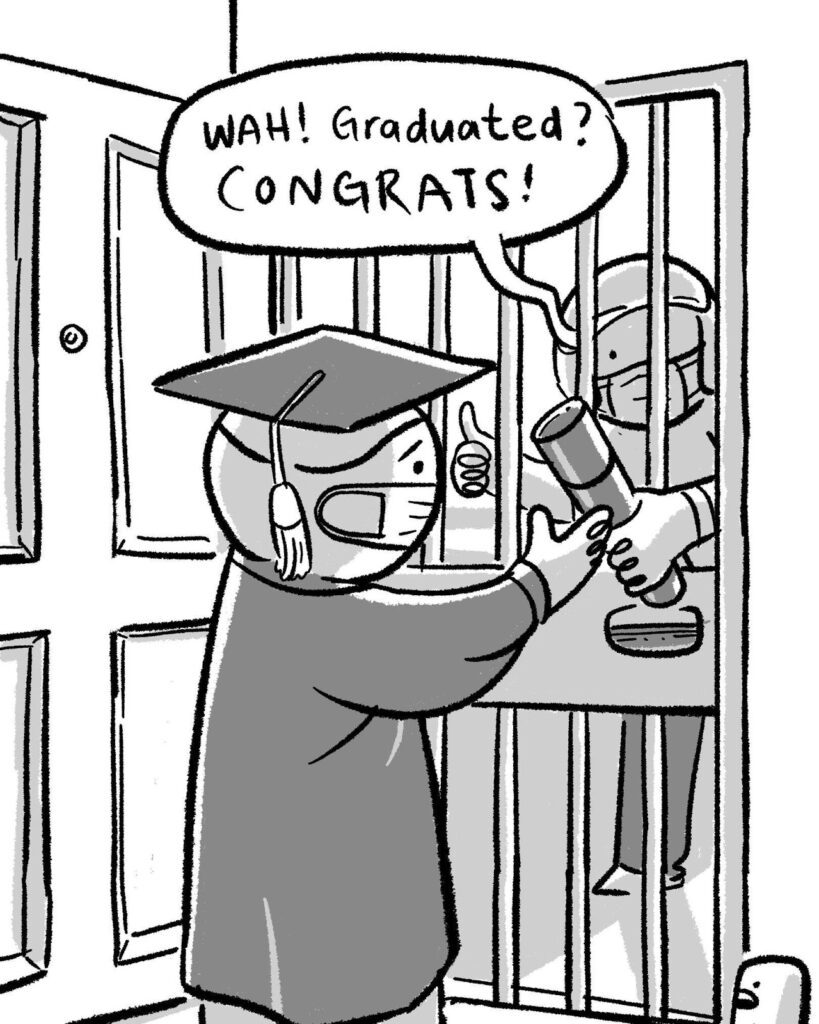
Producing content consistently was crucial in helping them to grow their audience. The Internet lets anyone post anything immediately—and right after, anyone can respond. Internet memes and trends also happen within an instant, changing on the daily.
As such, it’s impossible to develop digital campaigns with a traditional advertising process cycle. It won’t go live on time, and by the time the content is released, the moment has passed.
The Woke Salaryman now aims to post once a week, or at least three times a month. To achieve this, they work daily on producing finance content. And just in case their production schedule runs into issues, they have a stockpile of two to three posts that they can share on a rainy day.
Putting the reader first
In his previous office jobs, Ruiming found that, when critiquing campaigns, his clients and bosses would focus more on their own personal tastes instead of their customers’ needs.
“Many would try to say that the content didn’t reflect their brand voice, but what they really meant was that they just didn’t like the content or understand it,” he explains.
When creating content, Ruiming believes that marketers need to care about both the campaign objectives and the readers. “You need to provide real value to them,” he says.
Another issue Ruiming often runs into when consulting with brands is their fear that, by mentioning a competitor, they’ll lose out on potential customers. This also sacrifices the quality of the content, he says, and puts the focus on fluffing up the brand rather than on truly helping the reader.
“Sometimes you do need to mention other brands, or link to other competitors because that’s what is most useful,” Ruiming adds.
Comparisons are undeniably helpful, and trying to write content in a vacuum threatens that. “If you do that too much, what you get at the end is a boring promotional article with zero competitive advantages that you can point out because you don’t want to talk about your competitors,” he cautions.

These days, The Woke Salaryman works with a maximum of two brands per month. The pair stress the importance of being selective when choosing clients, explaining that bad clients who cannot accept the content marketing approach of providing value can have a very negative impact on audiences.
Authentic timeliness (aka, trendjacking)
Rather than aiming for virality, it’s important to focus on authenticity and timeliness. The duo call this trendjacking. By keeping a lookout for what users and readers are talking about and responding to, it’s possible to create more tailored content that the audience is more likely to share.
By joining popular social media trends or challenges (anything from the Ice Bucket Challenge to the TikTok #WipeItDown challenge), content creators have a chance to gain views and followers who connect with the value they’ve created. It’s also a great way to connect with the audience outside of a strictly-professional setting.
Wei Choon recently hosted a livestream on The Woke Salaryman’s Facebook page, speaking to viewers while taking on the Sailor Moon redraw challenge:
This leads us to our next point: being open to experimentation.
Constantly running experiments
Once in a while, the pair runs paid social media promotion experiments—dropping a hundred bucks, for example, to boost a particularly popular IG post—just to see whether they converts or not.
(From their experience, Instagram tends to do slightly better than Facebook)
But when it comes to new ideas, they tend to focus more on finance content experiments. “I’m constantly trying out new ways of storytelling that aren’t just focused on the technical aspects of finance,” says Wei Choon. “And I do this by using my own extra time—time I’m not spending on sponsored content or regular editorial content.”
For Wei Choon and Ruiming, experimenting is an important part of their journey to self-sustainability:
“It’s important to try new things and have things tank a little sometimes in the name of learning. We’ve seen many brilliant, talented creatives limit themselves because they think they’ve nothing left to learn. That’s something we both want to avoid. Also, new is always fun.”
They believe all companies—from the new to the well-established—should take a more flexible approach to content considering how rapidly trends evolve nowadays. You never know: a content experiment you’re passionate about could result in unexpected leads or amazing new ideas.
For example, one post that Wei Choon worked on—about a rich salaryman who worked hard all his life but died before getting a chance to reap the riches—was a major source of anxiety for him.
Previously, The Woke Salaryman hadn’t produced many comics with definitive narratives, and Wei Choon worried that the plot would be too cliché and predictable.
“The day before I posted it, I was so on edge,” he recalls with a laugh. “I almost didn’t post it because it was so different from everything else that we did […] I was so afraid that it would suck, and right before I posted it I was telling myself, oh man, this is shit.”
“But somehow people actually liked it. It has thousands of shares now.”
Of course, for every successful experiment, there are plenty of others that fail.
“We’ve done other stuff that flopped and nobody saw it. That’s the bad news, but it’s also good news because hey, no one saw it,” adds Wei Choon.
Know who you’re writing for
Many content creators get stuck trying to do too many things—they try to play too many roles or appeal to too many audiences, and end up losing their identity in the process.
Ruiming and Wei Choon realized early on that they were designed to appeal to the “top of the funnel”, so to speak: people just starting to learn about finance.
“We are in many personal finance communities that are so amazing, and so familiar with the intricacies that they don’t really need our content. Sometimes they may even see our posts and think it’s been too dumbed down. But the thing is, we need a good mix of both technical and ‘dumbed-down’ content.”
The Woke Salaryman sees themselves as “the hook that gets people caring about their own finances—after that, they can join communities and read blogs and learn even more.” They cater to their current audience—money enthusiasts, salarymen, and personal finance beginners—through a mix of general and more niche content.
It’s impossible to expect every post to get huge numbers. Instead, they try to be realistic about how much traction a topic can get, and focus on writing what their audience needs.
Posts covering general topics often get shares up into the thousands. A niche topic, on the other hand, may only get several hundred. But they always measure success through the number of shares their content gets—not pageviews or likes or web traffic.
“Shares are what tells us somebody says, wow, this is good, this is so useful that it’s worth passing on to someone else,” says Ruiming.
“Currently, we see around 100 to 500 shares per article, and between 1000 to 3000 shares per comic on average.”
https://www.facebook.com/wokesalaryman/posts/2660414314274072
Their most recent comic—a partnership with Singtel Dash—earned over a thousand shares, well within their target range.
Staying true to Singaporean roots
The Woke Salaryman is a very Singaporean blog, with many of the posts and comics using Singlish and discussing issues unique to the country.
“We feel that if you zoom out too much, you lose focus,” explains Ruiming. “Whereas if you just write it for Singapore and own the fact that we’re in Singapore at the moment, the audience will adjust and keep in mind that this is a Singaporean page, with Singaporean currency, Singaporean socioeconomics, and Singaporean viewpoints.”

Indeed, they’re big on local pride. Even down to the way Wei Choon draws backgrounds: “I tried to make it look like Singapore with HDBs in the back, laundry hanging out the windows. I embrace that aspect because I think it also makes it interesting for audiences from other places.”
Many content creators and companies lose what makes them stand out in their bid to go global. But the founders see their local perspective as a major advantage.
Even with the Singaporean focus, The Woke Salaryman already has readers all around the world.
“Our blog traffic is roughly 75% from Singapore, with the others from Indonesia, the United States and Malaysia. Interestingly, we’ve had people as far as Trinidad and Tabago send in their well-wishes,” Ruiming shares.
In the process of growing their readership, they’ve been able to “export” local culture and quirks beyond Singapore’s borders, and give others a glimpse of what it’s like in other parts of the world.
Goals for the future
Diversifying
In the near future, Wei Choon and Ruiming hope to continue diversifying content.
Their main “product” right now are the comics they share on Facebook. Those have anywhere from twenty to fifty panels. Instagram has a 10-image carousel limit, so they often use the platform to link either to web articles or to their Facebook page.
The articles they publish on their website are much less image-heavy—usually just five to ten images—with more emphasis on Ruiming’s copy.
“For the short term, we want to continue building our brand and earn enough cash flow for two to three years of runway,” explains Ruiming. “We’re taking a wait-and-see approach while continuing to create the content that has made us successful this year.”
“As creators and writers, it’s important to not limit yourself to a specific medium, so we’d like to explore more content formats.”
Most recently, COVID-19 has highlighted the fact that many people still don’t know how to manage their finances safely. To respond to this, they’ve been entertaining the idea of a boot camp for finance beginners to help teach better financial decision making skills.
“Another option we’ve considered is free books or educational content to cover the basics,” Ruiming adds.
On staying honest
Despite The Woke Salaryman’s altruistic goals, it is still a business that needs money to run.
“We’re always open with our readers about how we are in this to create revenue. By being transparent and open, we will never need to beg them for money,” they explain.
By doing so, the duo can always be honest with the things that they say rather than “bending over backwards because our operating expenses are just so high that we absolutely cannot reject a sponsorship […] that would be a disservice.”
“The power to say no every single time is very important for any content-based business,” Ruiming adds.
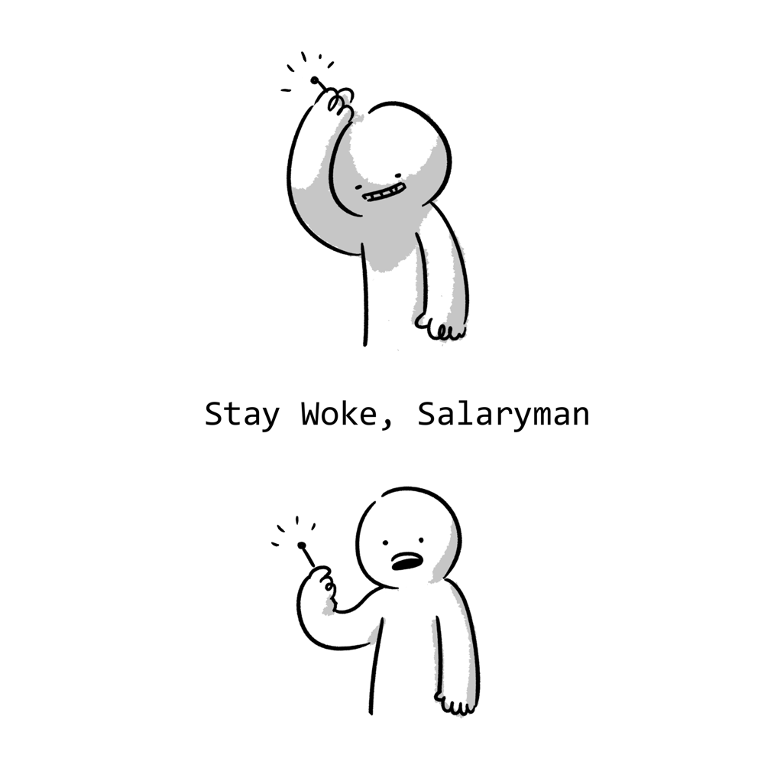
Building up to The Woke Salaryman, Ruiming and Weichoon took jobs that helped them get closer to their dreams of financial stability and independence—even though they may not have been fully aligned with their ideals. Biting the bullet early on helped them to create a cushion in order to spend more time on The Woke Salaryman.
“With any luck, this can be our main focus and we can tell stories and draw pictures for a living—producing our own content. That would be amazing,” says Ruiming.
Becoming undeniable
Their ultimate goal in building The Woke Salaryman—aside from making enough to do it full time—is to become an “undeniable” player in the personal finance space.
“We want to get to the point where, if someone is talking about personal finance in Singapore and they don’t mention us, it’ll feel like they’ve left something out,” Ruiming says.
To Wei Choon, “undeniable” is the ideal way to describe their mission. To get to that point, they rely heavily on creating irreplaceable content.
“When you place arbitrary numbers as your goal, it’s really hard to measure or predict that kind of success,” adds Ruiming.
“That’s why we chose to focus more on being undeniable—because we can control how great our content is. If your content is not good, then what’s the point? It will be so hard to read your numbers or you’ll just be fighting a losing battle by boosting content you know isn’t good.”
“For us, content will always be the king,” he concludes.
We couldn’t agree more.
—
200+ industry-leading tech companies in Southeast Asia are happy clients of With Content. Join them and start delivering valuable content to your potential customers today.

